Historically, supply chains that deliver medicines in low- and middle-income countries have been organized to mirror the administrative structures of health systems. Often, government priorities serve the highest number of people to achieve public health goals. As inequities within populations grew, health systems did not always evolve to identify and meet the specific needs of typically underserved groups, including people of different genders, ages, abilities, races, religions, and origins. Similarly, supply chains have not adapted to the unique requirements of these groups, nor have systems collected disaggregated data to highlight the challenges and needs of these different groups to find solutions. This has contributed to and reinforced health system inequities.
JSI applies three key approaches to ensure more equitable and inclusive supply chains:
Build an equitable and inclusive workforce that promotes the active leadership and participation of people of all genders, statuses and identity who work throughout the supply chain (e.g., drivers, health workers, supply chain managers). This involves ensuring equitable recruitment, promotion, and opportunity by prioritizing inclusion and reducing barriers to participation. This could involve reconciling pay gaps for certain groups; changing norms that segregate men and women into different roles and impede women’s leadership; and establishing or strengthening workplace conditions and policies related to discrimination, safety, and harassment.
Adapt the supply chain to serve all customers equitably by involving the range of people that it serves. This includes clients, communities, and health and supply chain workers. From product and packaging preferences to delivery methods, their input helps the supply chain better meet their needs.
Enable customers to demand a high level of service by including choices about the types of products they receive, and where and when they receive them. This means promoting the active participation of people and communities and putting in place accountability mechanisms that promote action and resolution.
The SCALE project, implemented by inSupply Health and JSI, works in close partnership with national and county governments, staff, and migratory communities in northern Kenya to adapt the health supply chain to respond to unique needs. Thanks to the input of communities and health care workers, the project introduced innovations that include transforming mobile phone reporting and the resupply system to incorporate the use of voice and visuals. Additionally, the project worked across a range of devices to support access to community health volunteers (CHVs) with low literacy and connectivity. The project also adapted inventory management procedures that considered migration patterns.
These adaptations enabled about 3,500 CHVs to consistently report on logistics data, with rates increasing from virtually zero to between 60–80%. As such this provided increased data visibility for community health commodities for better decision making and improved the availability of essential health products.
As a global community, we need to take a more actionable and comprehensive approach to ensuring equity in the health supply chain. This will require the active participation of the people, communities, and workers served by and involved in the supply chain, while keeping in mind that these approaches must be financed and integrated into current efforts. We must also document, monitor, and share successes and failures to improve decision making. Finally, we must define metrics to hold these efforts and ourselves accountable to our commitments to public health and supply chain outcomes.
Together, we can ensure that lifesaving health products reach people when they need them, no matter who they are and where they live.
By Carmit Keddem, Nicole Danfakha, Danielson Kennedy Onyango, Yasmin Chandani with special thanks to WI-HER, and their commitment to gender and social inclusion in health supply chains.
